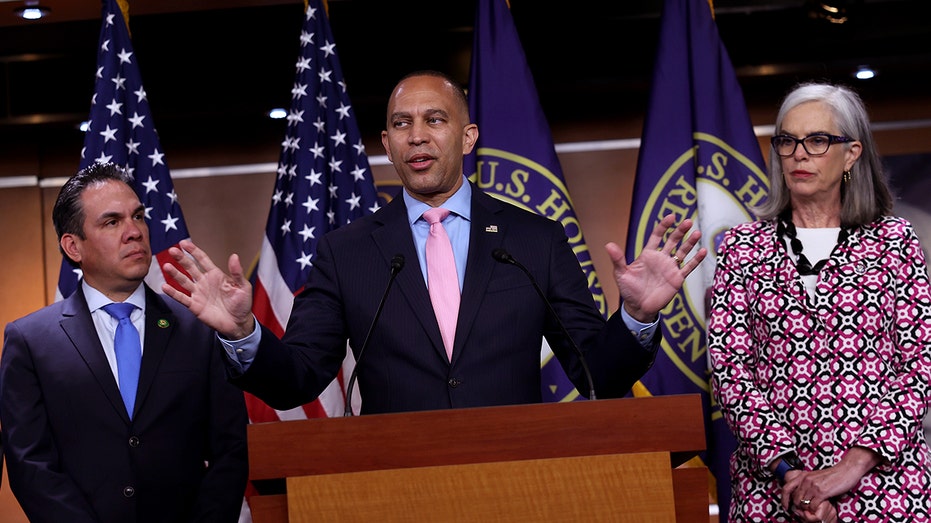Republicans’ New Speaker Pick Led Effort to Overturn 2020 Election
It’s Day 22, and the House still doesn’t have a speaker, though the GOP selected another designee out of an apparent carousel of contenders late Tuesday.Republican Conference Vice Chair Mike Johnson, a four-term congressman representing Louisiana, is the latest of the batch to try to unify the divided caucus. Johnson’s beliefs are a sweet spot for many GOP members: He’s anti-LGBT and rallied against Roe v. Wade. And when it comes to the 2020 election, he’s just a less dumb version of Jim Jordan, who played a close role in January 6 but failed to secure the speaker’s gavel earlier this month. In the days following the 2020 presidential election, Johnson played a more subtle but still key part: He led the amicus brief signed by more than 100 Republicans that sought to overturn election results in Georgia, Michigan, Pennsylvania, and Wisconsin. Then, on January 6, 2021, 139 Republican representatives voted to dispute the Electoral College results, in large part thanks to a loophole nitpicked by Johnson, who The New York Times described as the “most important architect of the Electoral College objections.”According to the Times, it was Johnson’s lawyerly nuance that made him dangerous.Offering possible objections based on what he described as “constitutional infirmity,” Johnson claimed there were grounds to reject the election results from states that permitted pandemic-induced state modifications to mail-in ballots and early voting systems that bypassed the approval of state legislatures.Ultimately, it was Johnson’s work that allowed Republicans to seize on the events of January 6 for political profit, helping them transform their brand from dangers to democracy to defenders of electoral integrity, and garner grassroots support and donations from corporate backers who had once denounced them.According to a leaflet from Johnson’s office obtained by Punchbowl News, Johnson’s core principles include: individual freedom, limited government, the rule of law, peace through strength, fiscal responsibility, free markets, and human dignity—though none of those seemed to conflict with his belief in overturning the 2020 presidential election results.Only a few GOP members have indicated so far that they will not support him in a floor vote. His endorsers include Majority Leader Steve Scalise, fellow contender Representative Kevin Hern, and perhaps most critical, Donald Trump.The Michael Scott look-alike is the second person to snag the speaker nomination in just one day, after Majority Whip Tom Emmer resigned mere hours after his own nomination.

It’s Day 22, and the House still doesn’t have a speaker, though the GOP selected another designee out of an apparent carousel of contenders late Tuesday.
Republican Conference Vice Chair Mike Johnson, a four-term congressman representing Louisiana, is the latest of the batch to try to unify the divided caucus. Johnson’s beliefs are a sweet spot for many GOP members: He’s anti-LGBT and rallied against Roe v. Wade. And when it comes to the 2020 election, he’s just a less dumb version of Jim Jordan, who played a close role in January 6 but failed to secure the speaker’s gavel earlier this month.
In the days following the 2020 presidential election, Johnson played a more subtle but still key part: He led the amicus brief signed by more than 100 Republicans that sought to overturn election results in Georgia, Michigan, Pennsylvania, and Wisconsin.
Then, on January 6, 2021, 139 Republican representatives voted to dispute the Electoral College results, in large part thanks to a loophole nitpicked by Johnson, who The New York Times described as the “most important architect of the Electoral College objections.”
According to the Times, it was Johnson’s lawyerly nuance that made him dangerous.
Offering possible objections based on what he described as “constitutional infirmity,” Johnson claimed there were grounds to reject the election results from states that permitted pandemic-induced state modifications to mail-in ballots and early voting systems that bypassed the approval of state legislatures.
Ultimately, it was Johnson’s work that allowed Republicans to seize on the events of January 6 for political profit, helping them transform their brand from dangers to democracy to defenders of electoral integrity, and garner grassroots support and donations from corporate backers who had once denounced them.
According to a leaflet from Johnson’s office obtained by Punchbowl News, Johnson’s core principles include: individual freedom, limited government, the rule of law, peace through strength, fiscal responsibility, free markets, and human dignity—though none of those seemed to conflict with his belief in overturning the 2020 presidential election results.
Only a few GOP members have indicated so far that they will not support him in a floor vote. His endorsers include Majority Leader Steve Scalise, fellow contender Representative Kevin Hern, and perhaps most critical, Donald Trump.
The Michael Scott look-alike is the second person to snag the speaker nomination in just one day, after Majority Whip Tom Emmer resigned mere hours after his own nomination.



